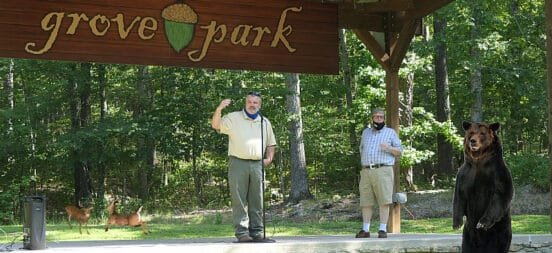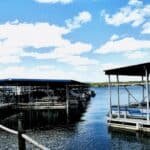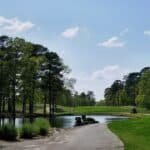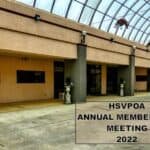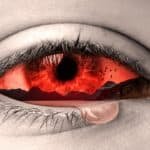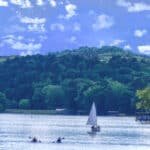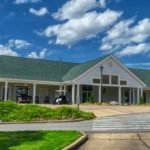NOTE: We had a little fun with the cover pic, which is photoshopped. There were no bears or deer by the stage when Todd Noles was speaking.
The following photo is real.
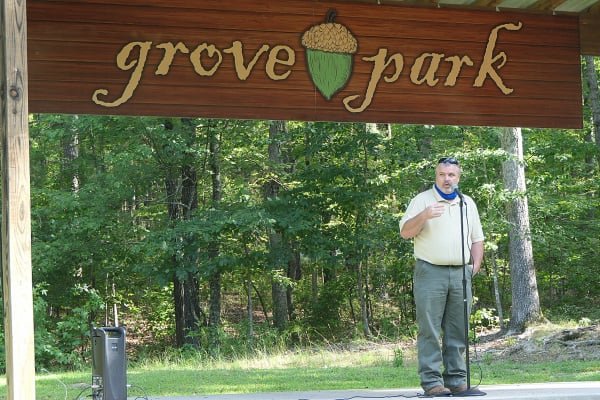
On Tuesday, August 11th, 9:30 AM at Grove Park, Casey Hardaway with the Arkansas Game and Fish Commission was scheduled to present a program on Bears and Bear Safety. As often happens in real life, things don’t always go as planned. The evening before the scheduled presentation, Casey notified Lifelong Learning Insitute (LLI) organizer, Larry Wilson that she would be unable to attend. Hardaway was in close proximity to someone who tested positive for COVID-19, so she has to quarantine for two weeks. But, it was decided the show must go on.
Wilson notified Todd Noles, HSV Manager of Common Property, Forestry and Wildlife, who agreed to give a presentation. (Video is at the end of this article.)
Villagers gathered around the outdoor stage at Grove Park to watch Noles give a report on Village bears, deer, and other subjects that come under Noles purview. Sitting comfortably in lawn chairs and distancing themselves six feet apart, the presentation was easy for the audience to hear due to HSV’s technical expert, Paul Moore, and his excellent placement of audio equipment.
Noles said, “I am a department of one, but I have a great committee backing me.” He is referring to the Common Property, Forest, and Wildlife Committee, which consists of Bruce Caverly; Dan Webb; Anne Shears; Tom Impellizzeri; Board Member, Kirk Denger; and soon-to-be-officially appointed Paula Lane and Max Billingsley.
“We’ve had a lot more black bear sightings this year than we have ever had. We originally thought that when the blackberries and pokeberries ripened, the black bears would leave. That hasn’t been the case. They found too many bird feeders and they [the bears] like it.”
Noles documents HSV bear encounters. So far, the bears in the Village have not shown any aggression outside of ruining bird feeders. “If the bears start to damage property, such as garage doors or show aggression towards humans, that is when we will have to come in and trap the bears for relocation,” explained Noles.
“We urge people to bring in their bird feeders and put an ammonia-based product on their trash cans. The ammonia scent will deter the bears.” The ammonia products can be found at Walmart, Brookshires, and other stores in the cleaning section.
Most of the bear sightings are around Lake Coronado, Lake Pineda, and Lake Cortez (around Carmona).
Noles said two adult bears and two juvenile bears have been sighted. One of them is a teenager around Vargas Way by Coronado Lake. Another juvenile has been regularly seen on Reata Way. There are also two adult bears around Lake Cortez.
The hunters participating in the HSV Urban Deer Hunt are allowed to put out their deer feeders and the bears may be attracted to the corn.
If you encounter a bear when you are walking, if you make some noise it will scare the bear away. Mama bears with cubs can be aggressive because she is protective of her babies. Clapping your hands and yelling will usually frighten the bear into leaving. The bears are as scared of humans as humans are afraid of the bears.
The bears give birth to their cubs around springtime. The breeding season is around September. In Arkansas, bears are active in the wintertime.
The Arkansas Game and Fish Commission has five phases of bear sightings. Currently, HSV is considered to be in Phase Two. Bears classified in Phase Two are bears that are not showing much fear of humans and are also still not showing aggression to humans or damaging houses or property other than bird feeders. If the bears start damaging houses or become aggressive, the Arkansas Game and Fish Commission will come and relocate the bears.
Keeping track of bears is only part of what the CPF&W Manager does
Noles is over HSV common property, forests, dams, spillways and wildlife. He works closely with Arkansas Game and Fish and Arkansas Hunters Feeding the Hungry to organize the HSV Urban Deer Hunt.
When Noles is not attending staff, board and committee meetings, he spends a lot of time evaluating trees and the health of the forest and helping property owners. Another job Noles is tasked with is seeding the lake dams with eight types of clover, rye, and oat to provide extra nutrition for wildlife. Noles also teams up with the National Monarch Butterfly Association. Monarch butterflies are becoming extinct and Hot Springs Village is in their migratory pattern. Noles planted butterfly Nymph Weed. He said the Monarchs enjoyed this plant last year so he feels this program was successful.
After the presentation, Noles answered more questions and handed out his business cards.
If you see a bear, contact Todd at Tnoles@hsvpoa.org.
Larry Wilson will be conducting a Zoom meeting with Bear Biologist, Casey Hardaway on Thursday, August 13, 2020. If you have a question you would like Larry to ask Casey, Larry can be contacted here. This Zoom meeting will be published on Larry’s YouTube channel. Click here to visit Larry’s YouTube channel.
* * *
HSV Bear Safety By Todd Noles
* * *
Click here to visit the Lifelong Learning Institute of Hot Springs Village Facebook Page.
Click here to visit the Lifelong Learning Institute of Hot Springs Village website.
* * *
By Cheryl Dowden, August 12, 2020
* * *
Thank you for reading. Click here to visit Hot Springs Village Community Forums.
* * *
Click here to visit the Hot Springs Village People Facebook Group. We hope you can join us and discuss this and many other issues in both the Facebook Group and the Village Community Forums.
